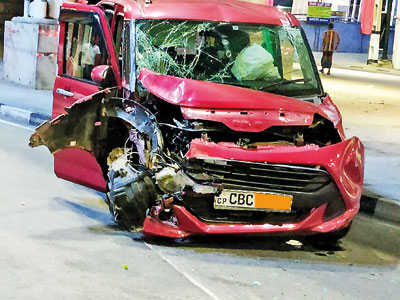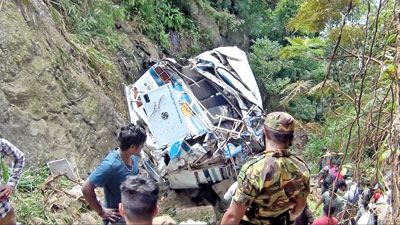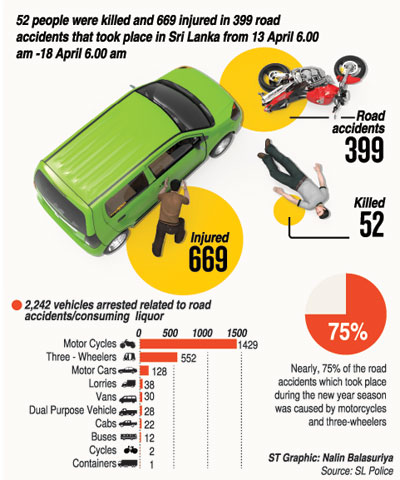News
Road deaths ‘like a tsunami hitting us day in and day out’
During Avurudu week, 52 people were killed in road accidents and more than 600 others admitted to hospital for treatment to injuries, police said.
“Enough is enough: people should take politicians to task for being defensive and blaming bad drivers or tyres,” Professor Amal Kumarage of the University of Moratuwa’s Department of Transport and Logistics Management said.

A recent accident in Welikada
“This is like a tsunami hitting us day in and day out,” Prof. Kumarage said, pointing out that the road accident death toll since the end of the civil war in 2009 could exceed 40,000. Reports put the number of war dead over 30 years of fighting at 80,000-100,000.
“We do not need billions of rupees, but with just 5 per cent of the annual budgetary allocations of Rs. 300 billion for the Road Development Authority (RDA), we could halve the number of road accidents in five years,” he said.
“What should be done is to fix issues at vulnerable road hotspots where 60 per cent of accidents recur,” he said. These hotspots could be junctions, bends or pedestrian crossings.
“We need to study serious accidents and fix the problem not only in that particular spot but in other similar places, as other countries do.” Dr. Kumarage drew a parallel with the airline industry where each accident is thoroughly studied and the findings and conclusions are shared globally.
“We have so far not learnt a thing about the Passara accident (in which 14 people died due to a bus hitting a fallen boulder on the road). We should learn from it to avoid similar incidents there and elsewhere in the hills,” he said.
“Our country is the only country in the world where the buses compete with each other for each passenger,” Prof. Kumarage said.
“In peak time in the morning, the Galle Road has 220 buses in an hour.” He questioned sustainability of such models.
Referring to the Passara bus accident, retired Assistant Commissioner of Motor Traffic J.A.S. Jayaweera said this was a classic example of negligence by the Road Development Authority (RDA).
“This particular boulder on the main road, partially obstructing the road, had been there for more than six months,” he said. It was removed a few days after the accident.

No report yet: Passara accident that claimed 14 lives
Poor road conditions account for a third of all accidents, Mr. Jayaweera said. “The RDA is responsible for the national highways. Proper maintenance and safety feature of roads are its responsibilities. Negligence and oversight on their part increase the possibilities of road mishaps.”
“Why did the RDA not erect notice boards warning the drivers of the obstruction (on the Passara road) or construct humps or speed breaking strips to slow down passing vehicles, let alone remove the boulder soon after it fell on the road?” Mr. Jayaweera questioned. “Such warnings and safety measures could have saved those lives.”
Mr. Jayaweera said police do not check bus drivers for their Public Transport Training certificates. More than 25,000 bus drivers have been trained by the Motor Traffic Department to provide disciplined and responsible service to the public but police do not check these certificate when checking driving licences, Mr. Jayaweera alleged.
Users of three-wheelers and motorcycles account for the majority of fatalities as the vehicles are not designed to bear a great impact. “The high number of fatalities involving those two kinds of vehicles does not mean the users are always the offenders,” Mr. Jayaweera pointed out.
Money spent on improving public transport could be compensated by savings on health care, “which could be billions of rupees annually”, Peradeniya University Forensic Department Professor Sarathchandra Kodikara pointed out.
He wants fines for bad driving increased as a deterrent and fairness measure. Death due to negligent driving, he said, attracts a fine that is too low to measure the value of human life in monetary terms. “This fine is not equitable. The law should be amended to reflect the actual value of human life,”
he said.



